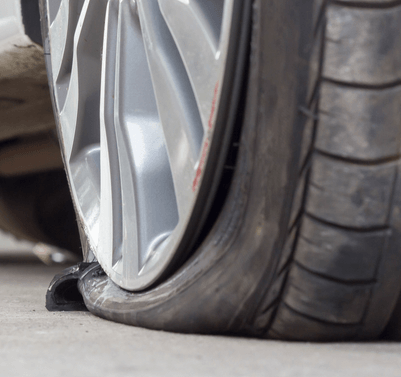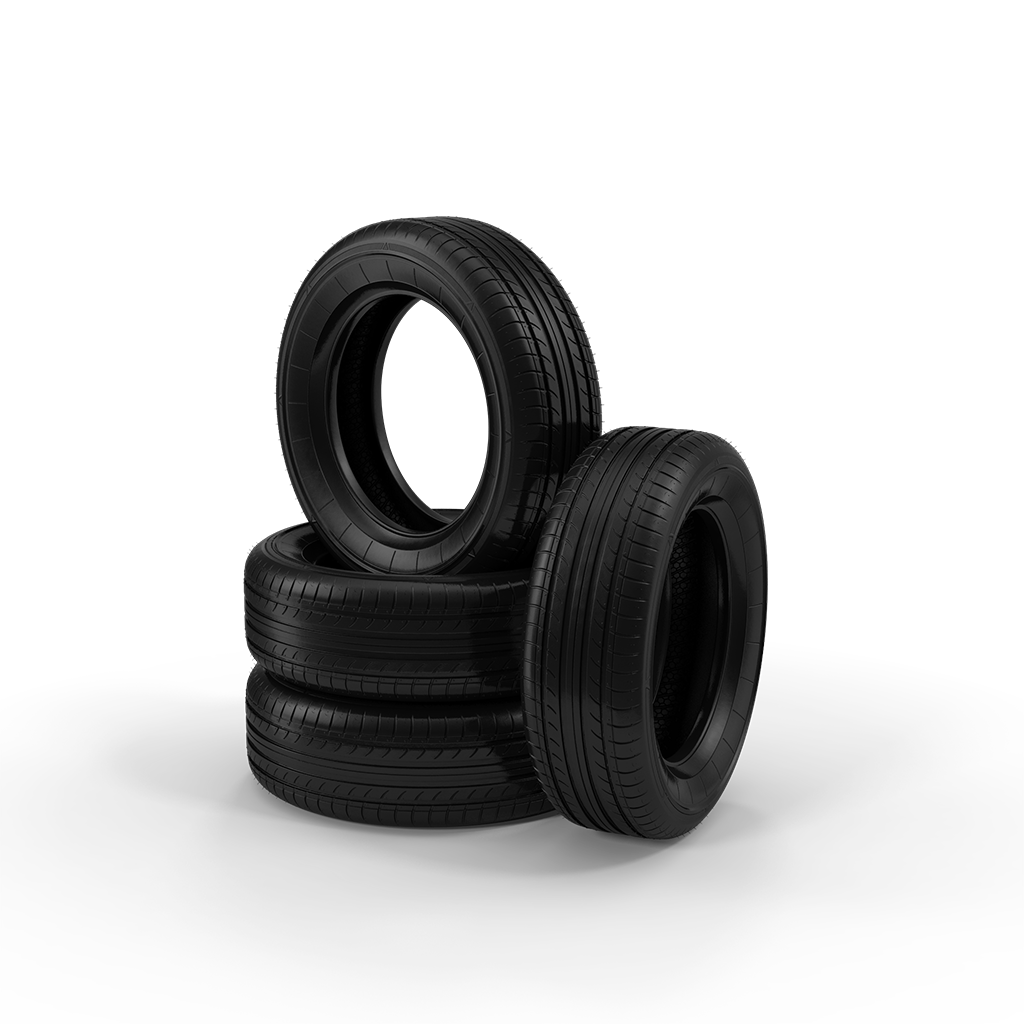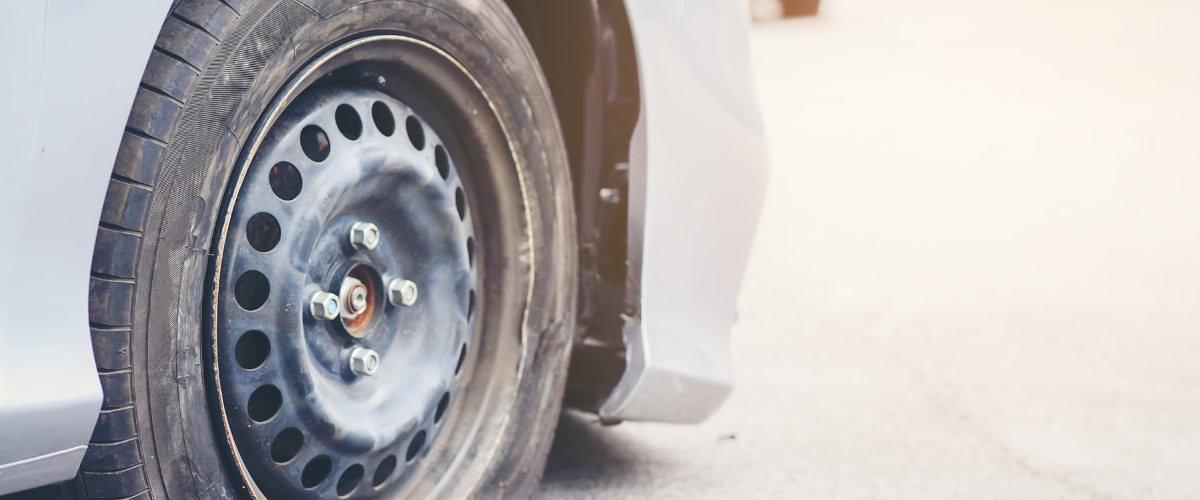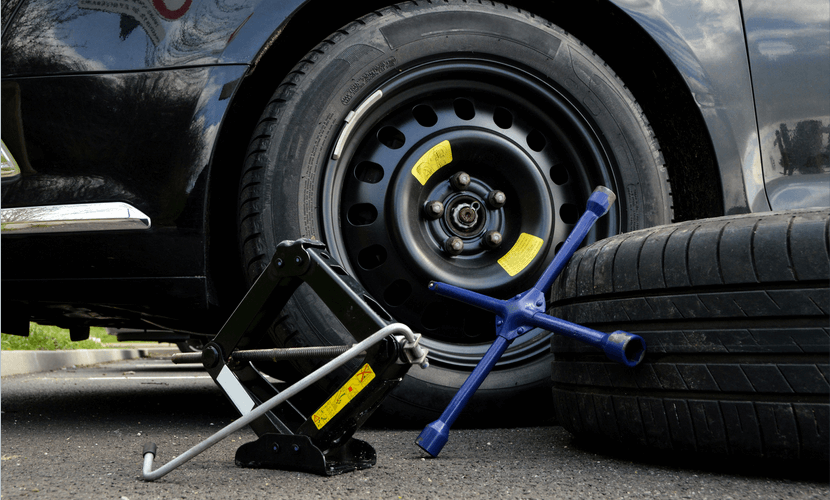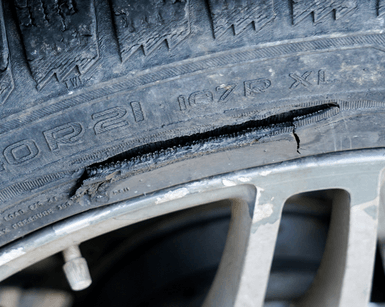Tire Patch and Flat Repair Services in Chapel Hill, Apex, Raleigh, Durham, & Carrboro
Maximize your vehicle’s safety and performance—schedule your tire service today!
Our Tire Services: Essential for Optimal Driving
Ensure your tires are in top condition with our comprehensive tire services. Proper tire maintenance is crucial for your vehicle's handling, fuel efficiency, and overall safety. Whether you need tire rotation, balancing, repair, or replacement, our expert technicians are here to help. Book your tire service now to enhance your driving experience and safety on the road.
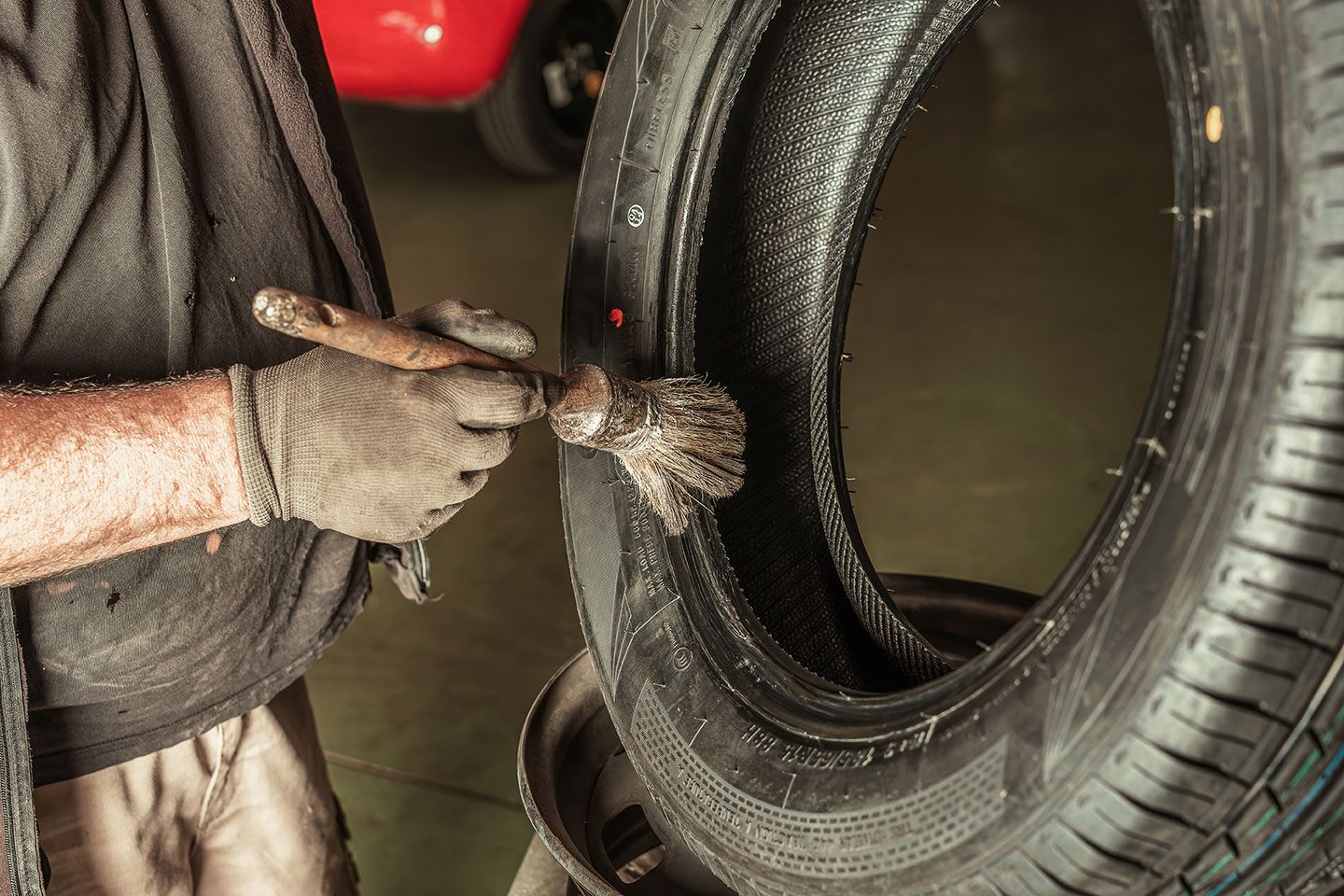
Tire Patch and Flat Repair Services in Chapel Hill, Apex, Raleigh, Durham, & Carrboro
The ominous low tire pressure light can leave you worried that you have a nail in your tire—or, worse even, a flat tire. While tire issues can be concerning, the service experts at Chapel Hill Tire are here for you with our affordable tire patch and flat repair services.
What Causes Tire Flats?
A wide variety of road hazards and tire deficiencies can cause flat tires. Common sources of flats include potholes, nails/puncture wounds, old/worn tires, and bent rims, among others. The cause of your flat tire and the extent of your damage will determine whether your flat tire can be fixed or needs to be replaced. Let’s look at a few common flat tire scenarios:
- For flats caused by old, worn, or severely damaged tires, you will most likely need a tire replacement rather than a flat repair.
- Is your flat tire caused by a bent rim? If this is the case (and the damage has not yet spread to your tires) you may need a rim repair/straightening instead of a flat tire repair.
- Are you seeing tire deflation because of a nail or puncture? This is often an easy fix, as your tire can be patched and reinflated by our experts.
Read our full guide to common flat tire causes and solutions here.
Tire Patching: What Causes Tire Punctures?
One common question from our customers: “How do nails get stuck in tires? ” Because they lay flat on the ground, it can be hard to understand how your tires collect nails instead of rolling right over them. Commonly, nails are often found on the sides of the roads where they may not be laying flat. When you make a wide turn or veer off the road (even if only for a moment), loose nails can easily find tires. Nails may also get stuck in your back tires after being kicked up by your front tires, or they may get stuck in your front tires after being kicked up by a vehicle in front of you.
While many drivers immediately assume that their dropping tire pressure is caused by a nail puncture, low tire pressure can have a wide variety of causes. Read our full guide on how to check your tire pressure and common causes of tire deflation here.
Tire Inspection & Maintenance
Ensure your safety on the road with our Expert Tire Inspection and Maintenance services. Our skilled technicians perform thorough inspections to identify potential issues and provide precision maintenance to optimize tire performance and longevity. Trust us to keep your tires in top condition, providing you with a smooth and secure driving experience.
Quality Tire Repair & Replacement
We offer professional tire repair services to fix punctures and damage safely. When repair is not an option, we provide a wide selection of quality tires for replacement, ensuring you get the best fit for your vehicle and driving needs.
Efficient & Reliable Tire Services
We understand the importance of having safe, well-maintained tires. Our team is committed to providing quick and reliable services, getting you back on the road with confidence.
Comprehensive Tire Services
Explore our range of tire services designed for your safety and convenience:
Standard Tire Care:
Flat Tire Repair: Assessing and repairing flat tires to restore integrity and safety.
Wheel Alignment: Adjusting the angles of your vehicle’s wheels to manufacturer specifications to improve handling and extend tire life.
Advanced Tire Solutions:
Winter Tire Installation: Preparing your vehicle for winter conditions with the appropriate snow tires.
Performance Tire Upgrades: Enhancing your vehicle’s performance with specialized tires designed for higher speed and agility.
Tire Pressure Monitoring System (TPMS) Checks: Ensuring your TPMS is functioning properly for continuous monitoring of tire pressure.
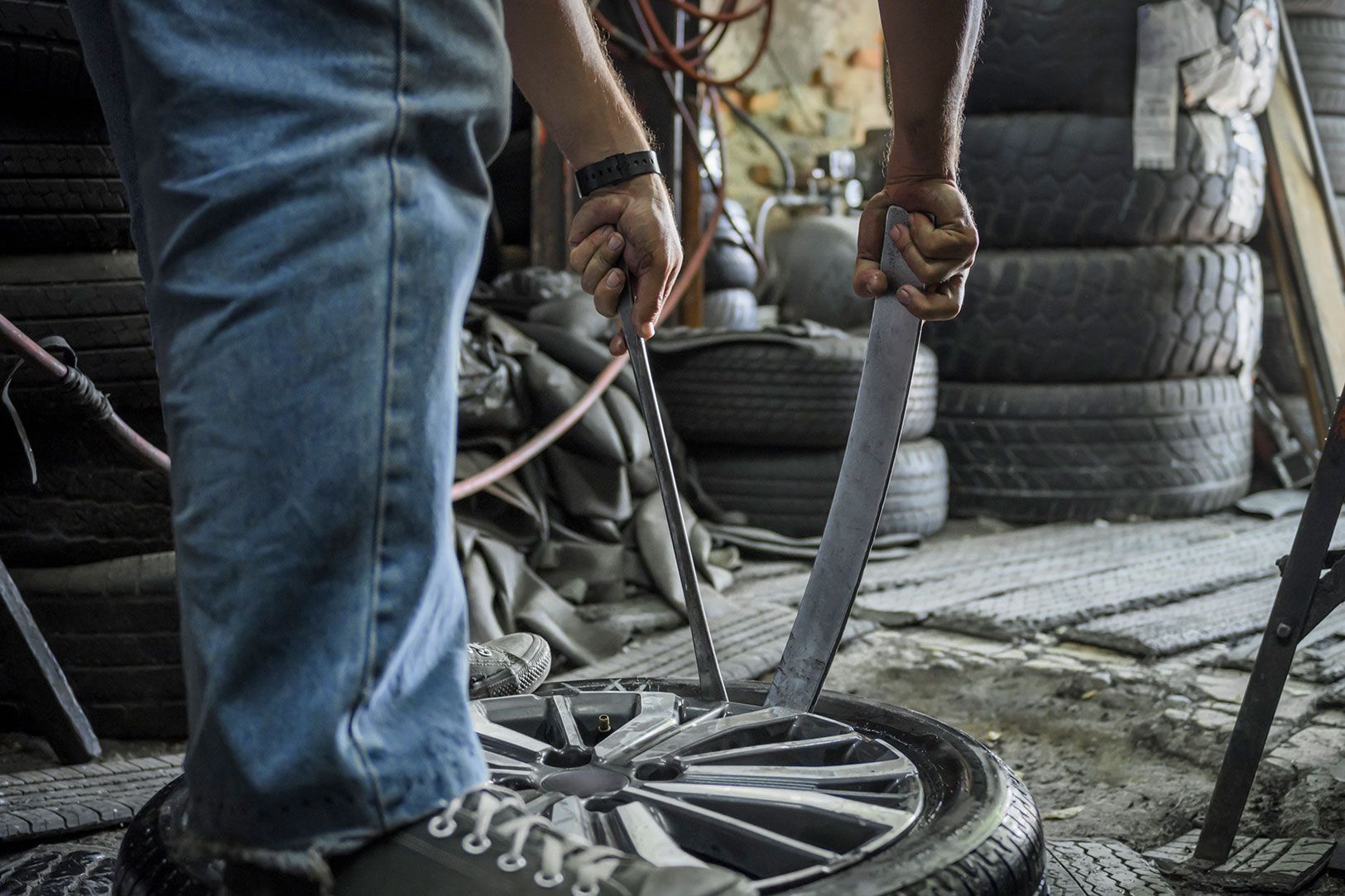
Guidelines for Tire Patching
Not all tire damage is repairable. Knowing when a tire can be safely patched or when it needs replacement is key to ensuring vehicle safety. Here’s a quick guide:
Can Be Patched:
- Punctures in the Tread Area: Damage less than 1/4 inch in diameter within the tread can typically be repaired with a patch and plug combination.
- Small Cuts or Holes: Similar small damages in the tread are often patchable if they do not affect the tire's internal structure.
Cannot Be Patched:
- Large Holes or Cuts: Any damage larger than 1/4 inch generally compromises the tire's structure too much for safe repair.
- Sidewall Damage: Punctures or cuts in the sidewall cannot be patched due to high failure risks from flexing.
- Damage to the Tire Shoulder: The area where the tread meets the sidewall also cannot be safely patched.
- Multiple Close Punctures: Punctures closer than 16 inches can weaken the tire's structure excessively.
- Previously Poor Repairs: Tires with multiple or poorly done repairs may not be suitable for further patching.
Always consult a tire repair professional to assess damage and determine the best course of action. Regular tire inspections can help catch issues early and ensure your tires remain safe.
Tire Repair FAQ
What documentation do I need to bring for a state inspection?
You will typically need to bring your vehicle registration, proof of insurance, and any required inspection forms or notices received from the state. Be sure to check with your state's requirements for specific documentation needed for the inspection.Do you offer state inspections, and what do they entail?
Yes, we offer state inspections to ensure vehicles comply with state-specific safety and emissions standards. State inspections typically include checks of safety-related components such as brakes, lights, tires, and emissions systems to ensure compliance with state regulations.What are the consequences of driving a vehicle with expired inspection stickers?
Driving a vehicle with expired inspection stickers may result in fines, penalties, or vehicle registration suspension, depending on state regulations. It's important to renew your vehicle's inspection promptly to avoid legal consequences and ensure compliance with state laws.How long does a state inspection take?
The duration of a state inspection can vary depending on factors such as the type of inspection required, the condition of the vehicle, and any necessary repairs or adjustments. In general, state inspections can typically be completed within 30 minutes to an hour.Can I drive my vehicle without passing the state inspection?
Driving a vehicle without passing the state inspection may result in fines or penalties, depending on state regulations. It's essential to ensure your vehicle meets inspection requirements to avoid legal consequences and ensure safety on the road.What is a state inspection, and why is it necessary?
A state inspection is a mandatory evaluation of a vehicle's safety and emissions systems to ensure compliance with state regulations. It is necessary to promote vehicle safety, reduce emissions, and maintain environmental standards.What happens if my vehicle fails the state inspection?
If your vehicle fails the state inspection, you will receive a report outlining the reasons for the failure. You will then need to have the necessary repairs or adjustments made to bring your vehicle into compliance. Once the issues are addressed, you can return for a reinspection.How often do I need to get a state inspection for my vehicle?
The frequency of state inspections varies depending on state regulations. In some states, inspections are required annually, while in others, they may be required every two years or when registering or renewing vehicle registration.Can I schedule a state inspection appointment in advance?
Yes, you can schedule a state inspection appointment in advance to ensure timely service. You can book an appointment online through our website, give us a call, or stop by our location in person. Our friendly staff will assist you in finding a convenient appointment time.What is involved in a state inspection?
State inspections involve a thorough examination of various vehicle systems and components to ensure compliance with state safety and emissions standards. This may include checks of brakes, steering, suspension, lights, tires, exhaust emissions, and more, depending on state requirements.
The Importance of Quick Service
When you catch a minimally-damaged flat tire or a nail early, you can prevent further issues by getting a quick repair. If you continue to drive with your tire pressure too low, you can create worsened damage, including bent rims, tire blowouts, and more. Low tire pressure can also impact your fuel economy, vehicle handling, and tire lifespan. This is why you should check your tire pressure every few months—or get a free tire pressure check and refill during each of your Chapel Hill Tire oil change visits.
Flat Tire and Tire Puncture Repairs Near Me
When it is time to get your flat tire serviced, Chapel Hill Tire will start with a free visual tire inspection to determine if you need a flat tire repair, a tire replacement, or another tire service. Once we determine the service you need, our experts will create a repair plan with you.
The Chapel Hill Tire network has 13 locations throughout the Triangle, including mechanics in Raleigh, Durham, Carrboro, and Chapel Hill. You can find a coupon for your first visit, and then make your flat repair appointment with Chapel Hill Tire to get started today!

